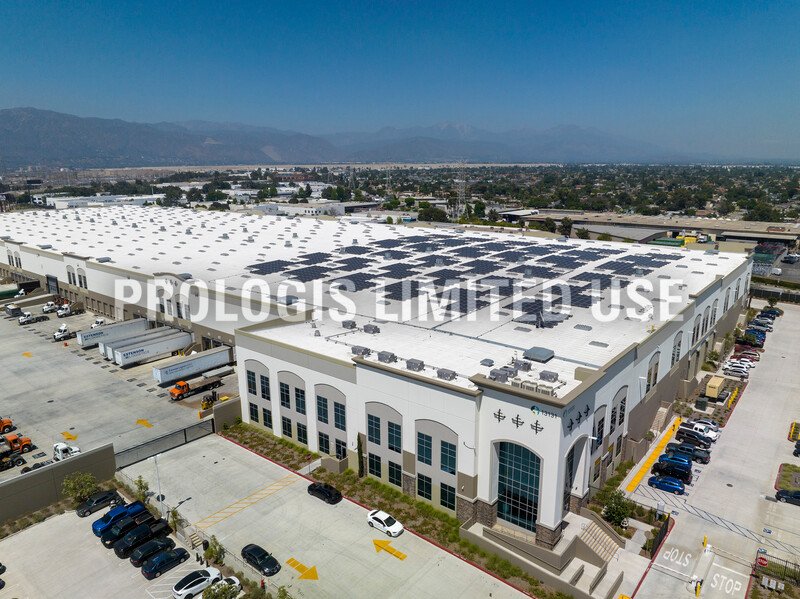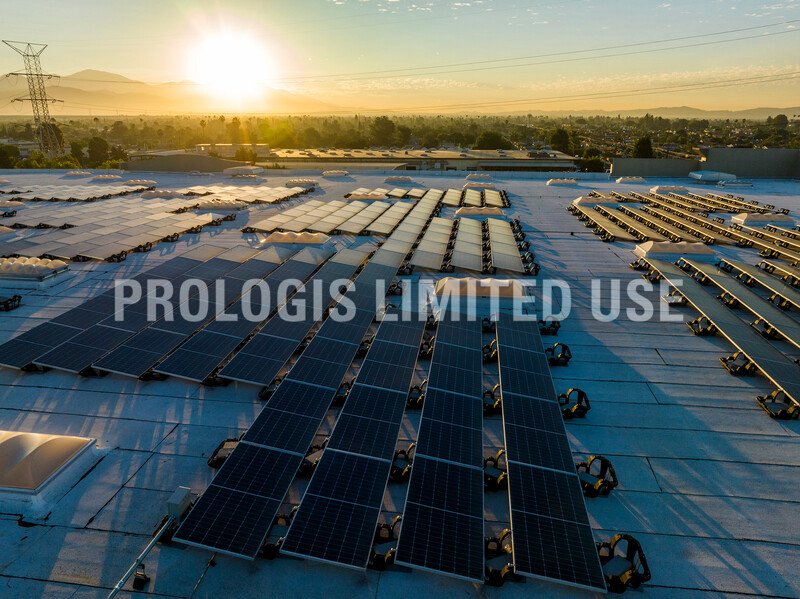Prologis Industrial Smart Building Wins Sustainable Innovation Award
Left to right: Grant Waldron, Alejandro Manilla, Rob Fernandez, Ryan McEvoy, Jennifer Lo (GAIA); Natasha Keefer (Prologis); Jacob Huber (RGA Office of Architecture); Chad Williams (Air Control Systems).
Los Angeles, December 8, 2023 – The Home Depot Distribution Center, located at 13131 Los Angeles Street in Irwindale, California, has been honored with a Sustainable Innovation Award for Merit in the Energy/Operational Carbon category at USGBC-LA’s 2023 Green Gala. This achievement highlights the increasing focus of high-performing buildings and sustainability initiatives in the industrial sector.
Innovative Design at the Forefront
GAIA, the sustainability consultants for The Home Depot Distribution Center, submitted the project due to its advanced smart technology features and LEED Platinum certification.
The 530,000 square foot Southern California facility includes a state-of-the-art Building Automation System (BAS), advanced smart metering, solar panels, high-efficiency air conditioning systems, and electric vehicle charging stations. Its adaptive LED lighting system autonomously regulates luminosity based on ambient daylight, optimizing energy use and significantly reducing CO2 emissions by approximately 800,000 kg annually.
A solar energy system with a capacity of 616 kilowatts was installed on the roof. This system is powerful enough to offset 90% of the building's energy needs each year.
The project’s smart metering system allows tenants to monitor and manage their energy consumption effectively while saving money.
What is a Smart Building?
At its core, a smart building is a property that leverages Internet of Things (IoT) technology to integrate and optimize its operational systems and processes. This approach minimizes unnecessary duplication and human mistakes. It involves the use of automation sensors, analytical tools, and interconnected systems, all collaborating to enhance the building's intelligence and self-sufficiency.
The market for highly energy-efficient smart buildings is expected to increase to $105 billion in 2025 in development costs from $66 billion in 2020, according to real estate investment firm KBS.
Environmental and Human Health
GAIA carried out a life cycle assessment with a focus on minimizing embodied carbon, which refers to the total amount of carbon dioxide emissions associated with the manufacturing, transportation, and construction of building materials, as well as end-of-life emissions. The embodied carbon, reported as global warming potential, was reduced by 11% compared to industry standard.
The project achieved a total potable water savings of 75% by installing a reclaimed water system for on-site water reuse, efficient irrigation, low-flow plumbing fixtures, advanced energy metering, and planting a drought-tolerant native landscape.
Features like skylights in the warehouse for natural daylight, operable windows, and non-toxic materials were chosen to improve air quality and overall wellbeing.
A community garden was installed on-site to promote a nutritious diet and sustainable lifestyle.
Stakeholder Benefits
The Prologis smart building is a prime example of how sustainable design and smart technology can be combined to create high-performing, cost-effective, and environmentally responsible properties that future-proof against climate risk.
Real estate developers, owners, and their investors can benefit from the following advantages when building new or retrofitting their properties to incorporate smart building features:
Reduced energy consumption and operating costs
Increased tenant satisfaction and retention
Improved employee productivity and satisfaction
Enhanced property value, marketability, brand image and reputation
Improved ESG performance
Increased compliance with regulatory requirements
As we see building technologies advance, architects and contractors play a vital role in helping their clients build assets at the forefront of their market and achieve their sustainability goals by incorporating the latest in automation, monitoring, and products into design specifications.
Project Team and Timeline
Designed by RGA, Office of Architectural Design, the project began construction and demolition around December 2020, undertaken by Duke Realty. The construction was completed in August 2022 with a lease by Home Depot. Prologis acquired Duke Realty in October 2022, adding it to its portfolio of smart buildings.
In addition to managing the LEED certification process, GAIA conducted energy and thermal comfort models, a solar and net-zero analysis, an early-stage life cycle assessment, and provided commissioning to the facility.
For media related questions contact Jennifer Lo, Marketing Director at GAIA, at jen@gaiadevelopment.com





